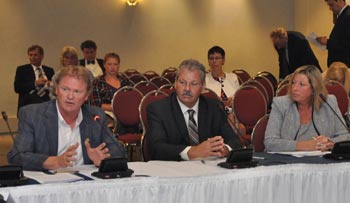This is an archive of news stories and research from the National Union of Public and General Employees. Please see our new site - https://nupge.ca - for the most current information.
“The numbers are staggering,” said OPSEU President Warren (Smokey) Thomas. “From 2003 to 2007 alone, the LCBO permitted close to $1 billion in retail alcohol sales to be sold through private agency stores."
 Trenton (29 June 2012) – An all-party legislative committee has been told that the Liquor Control Board of Ontario (LCBO) could dramatically increase its dividend to the provincial treasury by repatriating privately-owned and operated agency stores.
Trenton (29 June 2012) – An all-party legislative committee has been told that the Liquor Control Board of Ontario (LCBO) could dramatically increase its dividend to the provincial treasury by repatriating privately-owned and operated agency stores.
The Ontario Public Service Employees Union (OPSEU/NUPGE) made a presentation to the committee explaining to them how Ontario could stand to gain more than $350 million over the next 10 years if the LCBO repatriated the most profitable agency stores when their contracts with the Crown agency expire.
“The numbers are staggering,” said OPSEU President Warren (Smokey) Thomas. “From 2003 to 2007 alone, the LCBO permitted close to $1 billion in retail alcohol sales to be sold through private agency stores."
“This is nothing more than privatization through the back door. And successive Conservative and Liberal governments have gone along by giving this public money to private businesses."
Under terms of their contract with the LCBO, private owners of agency stores are paid a commission of 10 per cent on gross sales.
The LCBO agency stores were designated for rural and remote communities in northern Ontario where opening an LCBO retail outlet was not feasible. While the number of these agency stores has remained constant at about 80 locations, there are now more than 140 outlets in southern Ontario, some near existing retail stores in larger communities.
In a detailed financial analysis, figures show the top 100 private outlets in southern Ontario each earn revenues of more than $700,000 annually, an amount that would easily qualify for opening a ‘real’ LCBO store.
In 2009 these 100 privately owned-and-operated stores had combined sales of $161 million. If the LCBO brought these retail sales back to their own stand-alone outlets Ontario could benefit from an additional LCBO cash dividend of $340 to $370 million in the next decade, Thomas told the committee.
OPSEU/NUPGE, which represents more than 6,000 liquor board employees, has shared its financial findings on agency stores with the LCBO. It has gone unchallenged. The fiscal data used in the financial analysis comes from the LCBO’s own numbers.
“We hear a lot these days about austerity and about how our provincial government insists revenue streams have dried up,” said Thomas. “If this is true how is it that the Ontario government finds itself giving away millions of dollars in potential revenues instead of keeping it to pay for health care, education and other public services?”
NUPGE
The National Union of Public and General Employees (NUPGE) is one of Canada's largest labour organizations with over 340,000 members. Our mission is to improve the lives of working families and to build a stronger Canada by ensuring our common wealth is used for the common good. NUPGE
